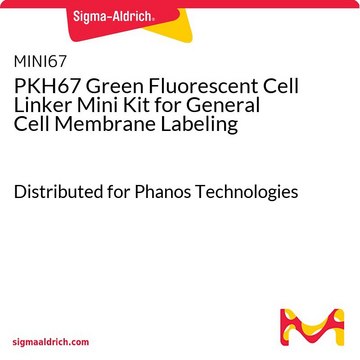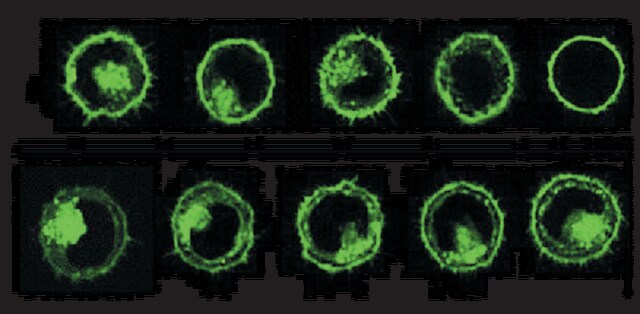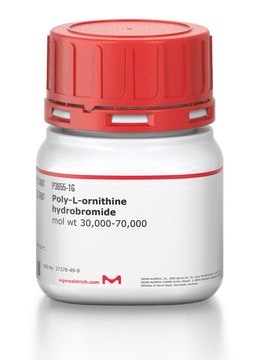P9670
Anti-Mouse IgG (whole molecule)–R-Phycoerythrin antibody produced in goat
affinity isolated antibody, buffered aqueous solution
Synonym(s):
GoatAnti-Mouse IgG (whole molecule)–R-PE
Sign Into View Organizational & Contract Pricing
All Photos(1)
About This Item
Recommended Products
biological source
goat
Quality Level
conjugate
phycoerythrin (R-PE) conjugate
antibody form
affinity isolated antibody
antibody product type
secondary antibodies
clone
polyclonal
form
buffered aqueous solution
technique(s)
indirect immunofluorescence: 1:20
shipped in
wet ice
storage temp.
2-8°C
target post-translational modification
unmodified
Looking for similar products? Visit Product Comparison Guide
General description
IgG is the main antibody type found in plasma and extracellular fluid and is expressed on B cell membrane. It plays a pivotal role in humoral immune responses like phagocytosis and complement activation.Anti-mouse IgG (whole molecule)-R-phycoerythrin antibody (diluted 1: 20) can be used as secondary antibody in fluorescence-activated cell sorting (FACS) analysis. It can also be used in flow cytometry. Goat anti-mouse IgG (whole molecule)-R-phycoerythrin antibody reacts specifically with mouse IgG and its subclasses IgG1, IgG2a, IgG2b, and IgG3. This product has also shown reactivity for mouse IgA and IgM but does not react with human serum proteins.
Immunogen
Purified mouse IgG.
Application
Anti-mouse IgG (whole molecule)-R-phycoerythrin antibody can be used as secondary antibody in immunocytofluorimetric analysis. It can also be used in immunohistochemistry and indirect immunofluorescence.
Other Notes
Antibody adsorbed with human serum proteins.
Physical form
Solution in 0.01 M phosphate buffered saline, pH 7.4, containing 0.1 mM EDTA, 1 mM iodoacetamide,
1% bovine serum albumin and 15 mM sodium azide.
1% bovine serum albumin and 15 mM sodium azide.
Preparation Note
Adsorbed to reduce background with human samples.
Disclaimer
Unless otherwise stated in our catalog or other company documentation accompanying the product(s), our products are intended for research use only and are not to be used for any other purpose, which includes but is not limited to, unauthorized commercial uses, in vitro diagnostic uses, ex vivo or in vivo therapeutic uses or any type of consumption or application to humans or animals.
Not finding the right product?
Try our Product Selector Tool.
Storage Class Code
10 - Combustible liquids
Flash Point(F)
Not applicable
Flash Point(C)
Not applicable
Choose from one of the most recent versions:
Already Own This Product?
Find documentation for the products that you have recently purchased in the Document Library.
Density enhanced phosphatase-1 down-regulates urokinase receptor surface expression in confluent endothelial cells.
Patrick M. Brunner
Blood, 117(154), 154-4161 (2011)
Ulrich Laufs et al.
Circulation, 109(2), 220-226 (2003-12-24)
The molecular mechanisms by which physical training improves peripheral and coronary artery disease are poorly understood. Bone marrow-derived endothelial progenitor cells (EPCs) are thought to exert beneficial effects on atherosclerosis, angiogenesis, and vascular repair. To study the effect of physical
Douglas S Jones et al.
Proceedings of the National Academy of Sciences of the United States of America, 108(32), 13035-13040 (2011-07-27)
The Met receptor tyrosine kinase and its ligand hepatocyte growth factor (HGF) play an important role in mediating both tumor progression and tissue regeneration. The N-terminal and first Kringle domains (NK1) of HGF comprise a naturally occurring splice variant that
Juliane Medler et al.
Cell death & disease, 10(3), 224-224 (2019-03-06)
Antibodies specific for TNFRSF receptors that bind soluble ligands without getting properly activated generally act as strong agonists upon FcγR binding. Systematic analyses revealed that the FcγR dependency of such antibodies to act as potent agonists is largely independent from
Allison R Sirois et al.
PloS one, 13(5), e0197029-e0197029 (2018-05-09)
Mesothelin is a cell surface protein that is overexpressed in numerous cancers, including breast, ovarian, lung, liver, and pancreatic tumors. Aberrant expression of mesothelin has been shown to promote tumor progression and metastasis through interaction with established tumor biomarker CA125.
Our team of scientists has experience in all areas of research including Life Science, Material Science, Chemical Synthesis, Chromatography, Analytical and many others.
Contact Technical Service








